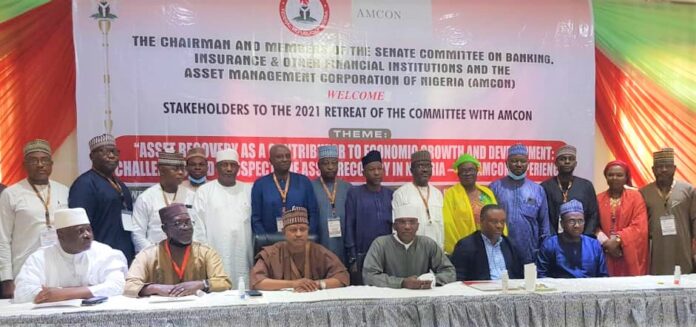The Chairman Senate Committee on Banking Insurance and other Financial Institutions, Senator Uba Sani at the weekend disclosed that the Senate would push and ensure that both the Nigerian Deposit Insurance Corporation (NDIC) and the Central Bank of Nigeria (CBN) collaborate and contribute more to support of the recovery efforts of the Asset Management Corporation of Nigeria (AMCON).
Sani made the declaration in Kaduna at the 2021 retreat of the Senate Committee on Banking Insurance and other Financial Institutions with the management of AMCON said that the Senate remains resolute in its stance to support AMCON as they battle to help the country recover the huge outstanding debt in the hands of a few obligors of the Corporation. He said the senate is in a haste to see that AMCON meets its set mandate within a reasonable timeline.
He said given the additional damage done to the Nigerian economy by the dreaded coronavirus (COVID—19) pandemic, which crushed the global economy including Nigeria, the time has come for sister agencies of the Federal Government of Nigeria most especially the NDIC and CBN to work closely with AMCON as a team by contributing additionally to the Resolution Cost Fund (RCF), in addition to the support from the banking industry.
Furthermore, he said, “In response to the impact of the COVID-19 on AMCON’s policies, and processes, the Senate amended the Act in 2021 by extending the tenor of the Resolution Cost Fund, and empowered AMCON to access the Special Tribunal established by the BOFIA, 2020 for dealing with financial related matters.
This is to reposition AMCON for optimal debt, and assets recovery performance. If the bill gets the concurrence of the House of Representatives and is assented to by the President (Muhammadu Buhari), it will not only boost AMCON’s asset recovery efforts but contribute effectively to our economic growth and development.”
Earlier on, Managing Director/CEO of AMCON Mr Ahmed Kuru told the committee that AMCON is strongly battling with its debt recovery activities. He said it is very difficult, particularly given AMCON’s peculiar situation.
He said out of total of N4.158 trillion, the Corporation has so far recovered over N1.48 trillion. Kuru disclosed that AMCON still has 7,902 outstanding obligors with total outstanding loan of above N3.1 trillion. According to him, 350 obligors alone account for over N2.053 trillion, which more than 70 per cent of total outstanding amount.
He added, “All our action is geared towards settling our obligation with the CBN. After recovery and disposal, funds are paid directly into our CBN account. Recovery and disposal of assets have so far contributed above N1.270 trillion towards settling our obligation.
The economy and the banking industry are not growing at the expected rate thereby creating a huge gap in our recovery activities. At the recovery rate we are currently experiencing, we may not be able to cycle out even in the next five years. Additionally, the interest rate AMCON is shouldering on its bond to the CBN is making it difficult for the recovery rate to grow.
“There is no easy way to recover money, no easy way. It is always difficult for both sides. One doing a hard job and the other responding to a hard situation. Let us not forget that these loans have remained uncollected for minimum of 10-15 years! Just imagine your neighbour coming for the repayment of loan given to him before your 10-year-old son was born. It is not easy! However, we have responsibility to collect and shall continue to pursue them within the purviews of the law.”
“You should not therefore be surprised when people/ obligor continues to report us to you or react based on one sided view in the social media. It is difficult for us, but it is a trust, which we intend to keep. The easy way for us is to be routine debt collectors, which I can assure you will not yield any result and we would continue to have the debt burden increasing due to compounding interest,” Kuru concluded.



